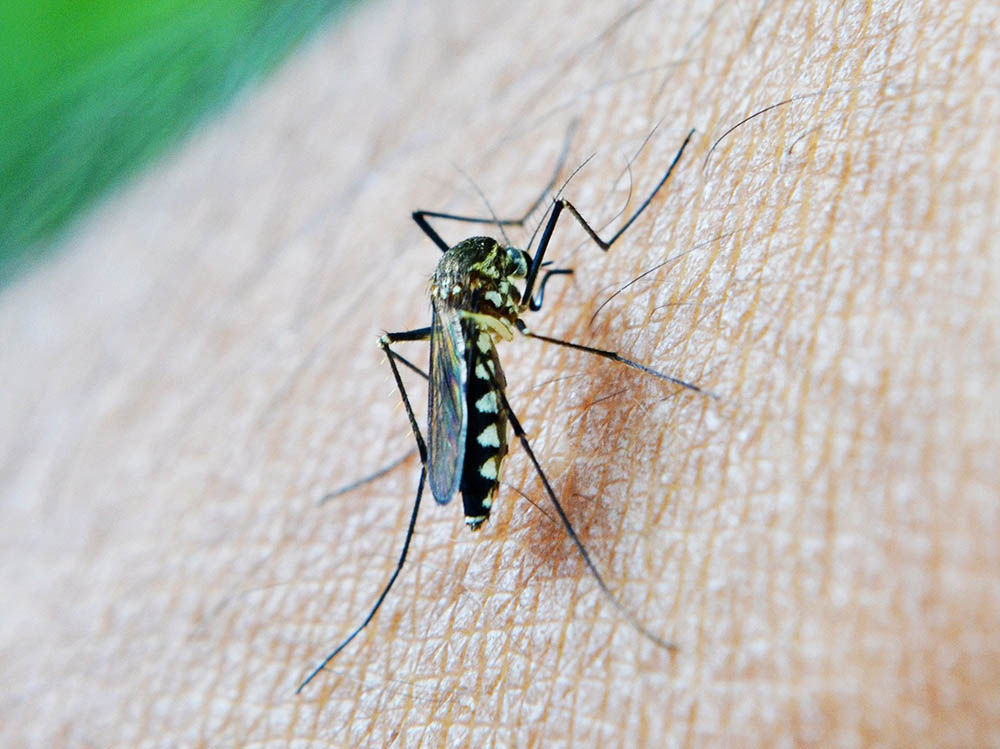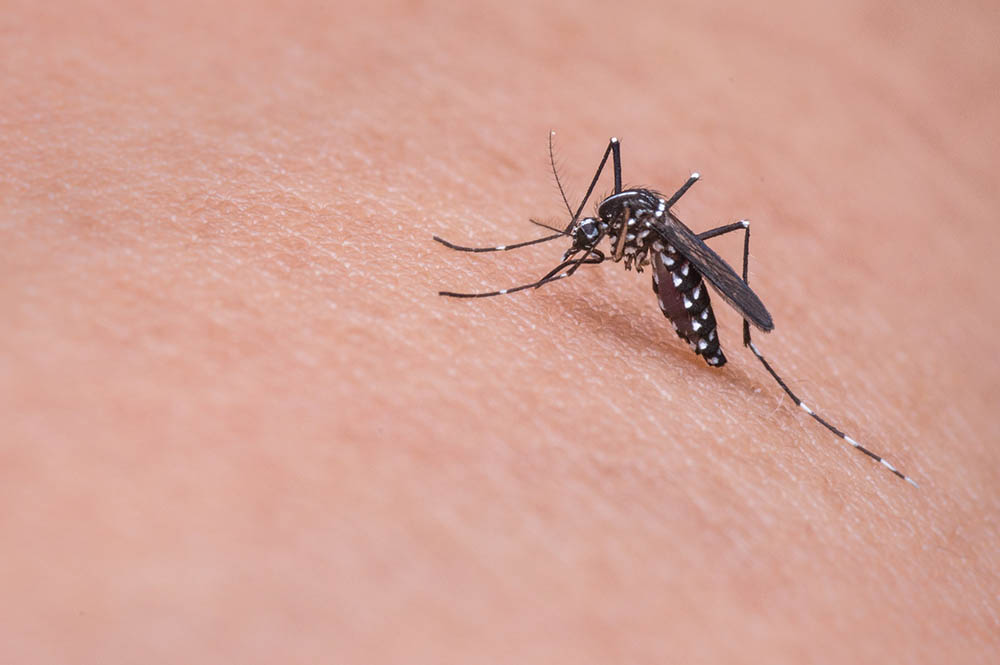What Attracts Mosquitoes? 12 Common Things
-
Chris Dinesen Rogers
- Last updated:

You only have to travel to Minnesota or Alaska once during the summer to understand why both jokingly refer to the mosquito as their state bird. Only 12 of the more than 200 mosquito species found in the United States are disease-carrying. Nevertheless, it’s not a stretch to call it the deadliest organism on the planet, causing 1 million deaths annually, 10 times more than snakes.
Scientists have long studied what attracts mosquitoes. It’s critical information for preventing bites and infections and reducing disease. You’re probably familiar with many things on our list. However, researchers have identified over 340 possible attractants to these pests. What they’ve learned is a fascinating tale of chemicals, hosts, and strange ecological relationships.

The 12 Things That Attract Mosquitoes
1. Heat

One of the mosquito’s main attractions is heat. It could be the warmth of your body just sitting outdoors or a cow resting under a tree in a pasture. The female insect can detect the heat an organism gives off and find its next victim. Mosquitoes bite for survival so that they can reproduce if that’s any consolation. However, they are often host-specific, meaning some species may only go after certain organisms.
Many share your situation, including other mammals, birds, reptiles, and even some fish. Mosquitoes can bite during the day or night, although dusk and dawn are prime times for them.
2. Carbon Dioxide
Scientists have long recognized that carbon dioxide attracts mosquitoes. They can detect it from over 200 feet away! You may notice that you get a bit more often if you’re exercising or doing strenuous activity. You’re breathing harder and more often, which is luring the insects your way. Interestingly, adults are more often targeted than children. They have a larger body size and give off more heat.
Of course, other factors are at work, too, such as activity, outdoor location, and lifestyle. It’s worth noting that mosquitoes are more likely to transmit diseases they acquire from children.
3. Lactic Acid

This one may surprise you since it’s not as obvious as the previous two. Many organisms, including humans, produce lactic acid. Our muscles and red blood cells make it, and scientists have found that mosquitoes often react to a combination of different chemicals that humans and other organisms emit. Research has found that lactic acid is one of the attractive compounds enticing these insects.
While this chemical doesn’t stay in this form for long in our bodies, bacteria in our guts also produce it and contribute to the things attracting mosquitoes to us.
4. Genetics
It’s probably not surprising that our genetics significantly determines whether one person is a mosquito magnet versus another. Humans have special genes that regulate our body odors. Thus, how they manage that task can vary with the individual. The interaction is complex because other things, such as your metabolic rate, have a genetic component unrelated to these other genes.
Genetics and other bodily functions affect how we respire and give off carbon dioxide. That can help explain why you’re more likely to get bit on your legs or arms than other parts of your body. Your limbs are probably exposed the most, making them an easy target.
5. Blood Type

Another factor determining who gets bit in a group is blood type. Again, genetics is the reason you may have or not have a certain set of antibodies. Of course, they’re quite different. Research has shown that one mosquito species (Aedes aegypti) prefers individuals with blood type B. It appears to be evolutionarily advantageous to the insects, too.
The scientists found that mosquitoes who bit on individuals with this blood type had more females with eggs than other ones. This information is particularly helpful for understanding who is at a greater risk of disease. It’s worth noting this species transmits dengue, a tropical viral disease.
6. Staphylococcus spp. Bacteria
Bacteria exist everywhere, including inside of us. Some species can respire and give off lactic acid. Research has shown that the bacterial profile of our skin is another mosquito attractant. Scientists compared the effects of different animal types with known insect species. The mosquitoes typically associated with humans preferred us over closely related primates, such as gorillas and chimpanzees.
We share 98.4% and 98.8% of our DNA with these great apes, respectively. Bonobos also come in at 98.8%. Researchers found that the mosquitoes preferred their odor profile over humans. Perhaps that’s the bit of DNA we’re glad we don’t share with this primate.
7. Parasitic Infections

It makes evolutionary sense that natural selection would favor easier ways to survive, especially if it was beneficial to an organism. One curious example is mosquitoes and malaria. Research has found that being infected with this parasitic disease increases the attraction to these insects. We can speculate that it would make it less risky for the mosquitoes to target a person who’s less likely to swat them.
8. Pregnant Women
Learning about mosquito attractants allows scientists to reduce the overall risk of insect-borne diseases by identifying vulnerable populations. Researchers found that pregnant women are one of those groups. Their findings showed mosquitoes preferred these individuals over non-pregnant women over short distances. It’s evidently something more than female hormones involved.
Scientists have postulated that pregnant women may respire and perspire more, therefore, releasing more heat and carbon dioxide. That makes sense, given the distance component of the equation.
9. Dark Clothing

We mentioned earlier the lengthy body of research done on mosquitoes. This study dates back to 1951. The findings show a definite preference for dark colors over light ones. The results are fascinating, given the fact that color was the only difference between the two setups. That’s something to remember when going outdoors. Pick light-colored clothes or outerwear to lower your mosquito appeal.
10. Cheese
These last attractants had us scratching our heads. We get the things about us that might bring on the skeeters. Learning that foods attract mosquitoes was a surprise. However, it’s probably not unexpected that something with a strong smell might be on the list. Researchers have found mosquitoes have a culinary taste. Their findings show a preference for Gruyere, Brie, and, of course, Limburger.
Ironically, these cheeses lure female mosquitoes and fruit flies to them while also being a toxic environment for them to lay eggs. They can kill the larvae.
11. Salts

This one seems like the elephant in the room. We have carbon dioxide and heat as attractants. We know that it’s usually a combination of factors. Research has shown that the salts in our perspiration may be another thing luring the mosquitoes in for the attack. It makes sense when you consider that you’re probably getting bit the more you exert yourself. That will, in turn, cause you to sweat more.
All these factors make the combination of odors irresistible to these pests.
12. Shiitake Mushrooms
The type and strength of different scents are part of the mix of things drawing in the mosquitoes. That’s one reason why strong cheeses ended up on our list. Another riff on that finding is mushrooms, or specifically, shiitake. Scientists observed the insects’ response to five types. All are varieties found in Thailand. Remember, subtropical and tropical areas are hot spots for insect-borne diseases like malaria.
Therefore, it follows that mosquitoes would be attracted to scents found in these places. It’s perhaps no coincidence that many people think Brie smells and tastes like mushrooms.

Tips to Avoid Getting Bit
The obvious takeaways are you can do things to lessen your chances of getting bit. Avoid any strongly scented products and dark clothing if you’re going to be outdoors. Don’t make it easy for the bugs to find you. It’s equally essential to realize that you can’t control everything, particularly when it comes to your DNA. That’s your roll of the dice.
A DEET-based repellent will keep you from getting bit and reduce your risk of insect-borne diseases, such as the West Nile Virus. We also suggest avoiding wetlands or deep forests when going out, if possible. Of course, mosquitoes are most active at dawn and dusk. Limit your time outdoors when they’re most likely to be on the hunt.

Conclusion
Mosquitoes have been around for about 100 million years. They aren’t going away anytime soon. The best we can do is use products to keep them at bay and avoid the attractants you can control, such as what you wear or use. As much as we despise them, they serve a valuable purpose in the ecosystem as food for other animals. However, we understand if you’re still frustrated with them.
- cdc.gov
- statista.com
- ncbi.nlm.nih.gov
- pubmed.ncbi.nlm.nih.gov
- livescience.com
- pubmed.ncbi.nlm.nih.gov
- sfamjournals.onlinelibrary.wiley.com
- pubmed.ncbi.nlm.nih.gov
- cdc.gov
- pubmed.ncbi.nlm.nih.gov
- education.seattlepi.com
- medlineplus.gov
- pubmed.ncbi.nlm.nih.gov
- nature.com
- pubmed.ncbi.nlm.nih.gov
- frontiersin.org
- pubmed.ncbi.nlm.nih.gov
- epa.gov
- academic.oup.com
Featured Image Credit: nuzree, Pixabay
Contents
